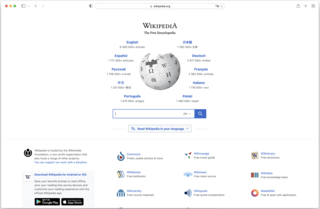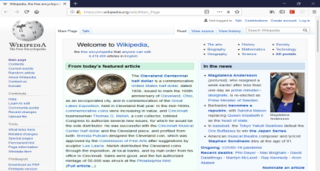
A web browser is an application for accessing websites and the Internet. When a user requests a web page from a particular website, the browser retrieves its files from a web server and then displays the page on the user's screen. Browsers are used on a range of devices, including desktops, laptops, tablets, and smartphones. In 2020, an estimated 4.9 billion people have used a browser. The most used browser is Google Chrome, with a 65% global market share on all devices, followed by Safari with 18%.
Xcitium, formerly known as Comodo Security Solutions, Inc., is a cybersecurity company headquartered in Bloomfield, New Jersey.

HTTP cookies are small blocks of data created by a web server while a user is browsing a website and placed on the user's computer or other device by the user's web browser. Cookies are placed on the device used to access a website, and more than one cookie may be placed on a user's device during a session.
A browser extension is a software module for customizing a web browser. Browsers typically allow users to install a variety of extensions, including user interface modifications, cookie management, ad blocking, and the custom scripting and styling of web pages.

CCleaner, developed by Piriform Software, is a utility used to clean potentially unwanted files and invalid Windows Registry entries from a computer. It is one of the longest-established system cleaners, first launched in 2004. It was originally developed for Microsoft Windows only, but in 2012, a macOS version was released. An Android version was released in 2014.

VirusTotal is a website created by the Spanish security company Hispasec Sistemas. Launched in June 2004, it was acquired by Google in September 2012. The company's ownership switched in January 2018 to Chronicle, a subsidiary of Google.

Google Chrome is a cross-platform web browser developed by Google. It was first released in 2008 for Microsoft Windows, built with free software components from Apple WebKit and Mozilla Firefox. Versions were later released for Linux, macOS, iOS, and also for Android, where it is the default browser. The browser is also the main component of ChromeOS, where it serves as the platform for web applications.

SRWare Iron is a Chromium-based web browser developed by the German company SRWare. It primarily aims to eliminate usage tracking and other privacy-compromising functionality that the Google Chrome browser includes. Iron ships with certain Chromium privacy options switched on by default, it provides some additional features that distinguish it from Google Chrome.

Comodo Internet Security (CIS) is developed and distributed by Comodo Group, a freemium Internet security suite that includes an antivirus program, personal firewall, sandbox, host-based intrusion prevention system (HIPS) and website filtering.

Chromium is a free and open-source web browser project, primarily developed and maintained by Google. This codebase provides the vast majority of code for the Google Chrome browser, which is proprietary software with additional features.

Chrome Web Store is Google's online store for its Chrome web browser. As of 2022, Chrome Web Store hosts about 123,000 extensions and 29,000 themes.

Genieo Innovation is an Israeli company, specializing in unwanted software which includes advertising and user tracking software, commonly referred to as a potentially unwanted program, adware, privacy-invasive software, grayware, or malware. They are best known for Genieo, an application of this type. They also own and operate InstallMac which distributes additional 'optional' search modifying software with other applications. In 2014, Genieo Innovation was acquired for $34 million by Somoto, another company which "bundles legitimate applications with offers for additional third party applications that may be unwanted by the user". This sector of the Israeli software industry is frequently referred to as Download Valley.

Epic is a proprietary privacy-centric web browser. It was developed by Hidden Reflex, a software product company founded by Alok Bhardwaj, using Chromium source code. Epic is always in private browsing mode, and exiting the browser deletes all browser data. The browser's developers claim that Google's tracking code has been removed, and that blocks other companies from tracking the user.

Web browsing history refers to the list of web pages a user has visited, as well as associated metadata such as page title and time of visit. It is usually stored locally by web browsers in order to provide the user with a history list to go back to previously visited pages. It can reflect the user's interests, needs, and browsing habits.
Browser security is the application of Internet security to web browsers in order to protect networked data and computer systems from breaches of privacy or malware. Security exploits of browsers often use JavaScript, sometimes with cross-site scripting (XSS) with a secondary payload using Adobe Flash. Security exploits can also take advantage of vulnerabilities that are commonly exploited in all browsers.
SmartScreen is a cloud-based anti-phishing and anti-malware component included in several Microsoft products, including operating systems Windows 8 and later, the applications Internet Explorer, Microsoft Edge. SmartScreen intelligence is also used in the backend of Microsoft's online services such as the web app Outlook.com and Microsoft Bing search engine.

Google Safe Browsing is a service from Google that warns users when they attempt to navigate to a dangerous website or download dangerous files. Safe Browsing also notifies webmasters when their websites are compromised by malicious actors and helps them diagnose and resolve the problem. This protection works across Google products and is claimed to “power safer browsing experiences across the Internet”. It lists URLs for web resources that contain malware or phishing content. Browsers like Google Chrome, Safari, Firefox, Vivaldi, Brave and GNOME Web use these lists from Google Safe Browsing to check pages against potential threats. Google also provides a public API for the service.

Comodo IceDragon is an abandoned Firefox-based open source web browser from the Comodo Group for Microsoft Windows.
Federated Learning of Cohorts (FLoC) is a type of web tracking. It groups people into "cohorts" based on their browsing history for the purpose of interest-based advertising. FLoC was being developed as a part of Google's Privacy Sandbox initiative, which includes several other advertising-related technologies with bird-themed names. Despite "federated learning" in the name, FLoC does not utilize any federated learning.













